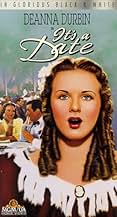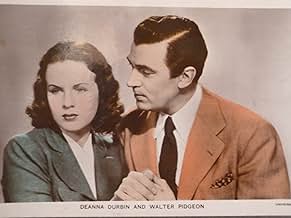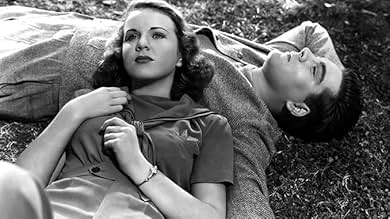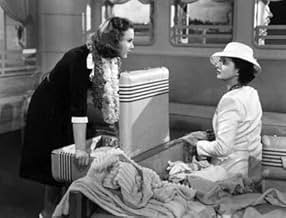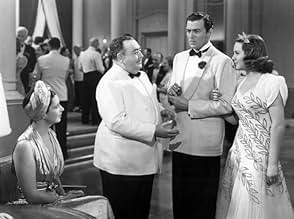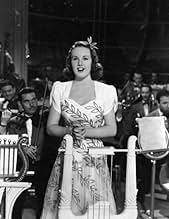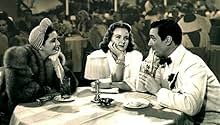Aggiungi una trama nella tua linguaAn aspiring actress is offered the lead in a major new play, but discovers that her mother, a more seasoned performer, expects the same part. The situation is further complicated when they b... Leggi tuttoAn aspiring actress is offered the lead in a major new play, but discovers that her mother, a more seasoned performer, expects the same part. The situation is further complicated when they both become involved with the same man.An aspiring actress is offered the lead in a major new play, but discovers that her mother, a more seasoned performer, expects the same part. The situation is further complicated when they both become involved with the same man.
- Regia
- Sceneggiatura
- Star
- Premi
- 4 vittorie totali
- Ship's Steward
- (non citato nei titoli originali)
Recensioni in evidenza
The plot summary revolves around Georgia Drake (Kay Francis), a successful Broadway actress just completing her 400th and final stage performance of "Gypsy Lullaby." In attendance are its producer, Sidney Simpson (Samuel S. Hinds) and his friend, Carl Ober (S.Z. Sakall), a playwright visiting from Vienna. In a separate balcony are Georgia's daughter, Pamela (Deanna Durbin), and her escort boyfriend, Freddie Miller (Lewis Howard). Ober is seeking for an particular leading lady for his upcoming production of "Saint Anne," and feels Georgia too old for the part. After meeting with Pamela, however, he finds she'll make the perfect Saint Anne. Awarded the title role, Pamela accepts, unaware that this is the role her mother is eager to play. With Georgia already vacationing in Honolulu, Pamela, knowing her mother to be her best acting coach, arranges to meet with her in Hawaii. While on board the ship, S.S. Honolulu, Pamela lives her part to the fullest by reading her script, thus, causing John Arlen (Walter Pidgeon), a businessman and fellow passenger, to mistake her for an extremely unhappy young girl. To keep her mind off her troubles, John pretends to be a stowaway hiding in a lifeboat and allowing her to assist him with food and water during the voyage. After the misunderstandings are resolved, situations occur as Pamela learns the truth about the Saint Anne play. To spare her mother's feelings, Pamela uses Mr. Arlen as the source to keep her mind off the play, followed by some unforeseen circumstances.
Other appearing in the cast include: Eugene Palette (Governor Allen); Henry Stephenson (Captain Andrews); Cecilia Loftus (Sara Frankenstein, Georgia's personal maid and no relation to the Mary Shelley novel character); along with the familiar faces of Charles Lane, John Arledge, Eddie Acuff, Fritz Feld and Virginia Brissac, among others. Because the Drake women are depicted as part of a generation of actresses, maybe Cecilia Loftus should have played the actress grandmother discussed in conversation rather than the personal maid to make this family generation of actresses more bonding and acceptable to the plot.
The musical program includes: "Gypsy Lullaby" (voice dubbed "sung" by Kay Francis); "Love is All"(sung by Deanna Durbin); Traditional Scottish song of "Loch Lamond," "It Happened in Kaola" (by Ralph Freed and Frank Skinner); "Hawaiian War Chant," "Rhythm of the Islands," "Musetta's Street Song" from the opera, LA BOHEME by Giacomo Puccini; and "Ave Maria" by Franz Schubert. Durbin's rendition to "Ave Maria" is beautiful, but her earlier effort, "Love is All" is one of nicest songs ever sung by her. Producer Joe Pasternak must have loved "Ave Maria" enough to use it again for Jane Powell's HOLIDAY IN Mexico (MGM, 1946), which also featured Walter Pidgeon, as well as the story for a remake, NANCY GOES TO RIO (MGM, 1950) with Jane Powell and Ann Sothern in the Durbin and Francis roles. Because of the Pasternak style and Pidgeon in the cast, IT'S A DATE could easily be mistaken for an MGM film rather than one by Universal.
Still a teenager of about 18 or 19, Durbin has developed into an attractive young lady. For the movie in general, 103 minutes is quite a drawn-out process in storytelling, thus, standing apart from Durbin's 87 to 95 minute feature film presentations. Yet, what makes it so watchable, other than Durbin's song interludes, are the veteran players as former Warner Brothers star, Kay Francis; the debonair Walter Pidgeon on loan-out assignment from MGM; and soon-to-be character actor for Warner Brothers, S.Z. Sakall. With this being Francis' only assignment opposite Durbin, she would later appear opposite Gloria Warren, a Deanna Durbin look-a-like songstress, in a Durbin-type musical drama, ALWAYS IN MY HEART (Warner Brothers, 1942). While Durbin's film career extended until her retirement by 1948, Miss Warren, following a few more screen roles for other movie studios, disappeared to obscurity by the end of the decade.
Due to the aforementioned MGM remake, the 1940 original was reportedly unavailable for viewing for many years until the wake of cable television where it turned up on cable networks as Showtime (1985), a decade later on Turner Classic Movies, and availability on video cassette in the 1990s. To the film's credit, IT'S A DATE offers more than its share with amusements, songs, and story in the finest Durbin-style tradition. (***1/2)
When Durbin does get a chance to sing, she's great. She puts over all of her songs with professional skill and poise, doing an absolute standout job on "Ave Maria" and "Musetta's Waltz"--but the trouble is not enough time is spent on the vocals to showcase her amazing voice. Instead, we get Kay Francis and Walter Pidgeon falling in love while Deanna dreams up all sorts of schemes to keep her mother from knowing that she has won her mother's role in a play.
Deanna looks lovely at eighteen and has probably never been photographed more beautifully but this is the sort of vehicle that has you wishing the silly plot would move on so we can hear Durbin sing once more. Walter Pidgeon and Kay Francis are adequate in support. MGM later came up with a zestier technicolored remake called "Nancy Goes To Rio" with Jane Powell.
Trivia note: This was S.Z. Sakall's first screen appearance in an American film.
Kay Francis plays the mother (Georgia) and Deanna Durbin plays the daughter (Pamela), which makes this film eminently watchable. Walter Pidgeon is the man in the middle. At the time of filming, Francis was about 35 and Durbin was about 19, but Deanna had top billing and the meatier role. If Durbin's role had more substance, the film would have been more balanced and more interesting. As it is, the two actresses convey a warmth that compensates for a paucity of laughs.
"Cuddles" Sakall makes his Hollywood debut as the playwright for the show the women covet.
The narrative allows Durbin to display her marvelous pipes, of course. Her vocal numbers are shoehorned into the action, but they don't distract. In fact, they are one of the film's best features.
This was the seventh movie Deanna Durbin made with producer Joe Pasternak and cameraman Joseph Valentine, and the well was running dry. This drivel would give anyone with an IQ above 70 a raging headache--even in 1940. It's a trite tale of a mother (Francis) and daughter (Durbin) in love with the same man (Pigeon) as well as mother and daughter vying for the same leading role in a Broadway play. It's nonsense with neither an ounce of plausibility nor a single bit of wit, though it fancies itself a comedy. The very contrived plot is arranged to provide Durbin with a ridiculous assortment of songs: "Musetta's Waltz" from La Boheme, Schubert's "Ave Maria," "Loch Lomond," and a bland new ballad, "Love Is All." Kay Francis was looking quite fine here, though the costume designer should have been shot for giving her unflattering turban hats.
This was the first American film that S. Z. "Cuddles" Sakall appeared in, though he didn't have his nickname at that time. He was playing the sort of part here that he played throughout his Hollywood career.
And the film reminded me of what an insipid actor Walter Pigeon was.
Deanna is fledgling actress Pamela Drake, daughter of major Broadway star Georgia (Kay Francis). She works in a small regional theater but unexpectedly gets the chance to star on Broadway herself. Seeking seclusion in order to prepare for her big break, she heads home to Hawaii to spend some time with her mother. On the ship, she meets pineapple tycoon John Arlen (Walter Pidgeon), who first woos her but then also becomes interested in mama. It turns out that Georgia also expects to get the part already offered to Pamela and also wants John. Who gets the part? More importantly for these types of films, who gets the man?
Durbin is amazing, as always, and really gets the chance to show what a child prodigy she was (though clearly becoming a young woman here). She sings several standards such as "Loch Lomond" and "Ave Maria" with her fine soprano voice, and shows maturity far, far beyond her years. If you aren't familiar with Durbin, be prepared to be dazzled by her talent. There's one fine bit where Deanna, trying to convince the big-time producers (including S.Z. Sakall doing his usual hammy bit) to hire her for their show, does several wildly different characterizations in rapid-fire succession which are all excellent. Great acting talent, great singing voice, prettier in a classic sense than Judy Garland, Deanna was the complete package.
Pidgeon is great also, but he is up against formidable competition in the acting department here. He exudes his usual avuncular charm, and actually has some dashing moments on the ship to Hawaii as he tries to woo Pamela. Later, though, he appears bewildered at times, despite supposedly being the one in charge. Kay Francis is the clear loser. She is completely outclassed by Durbin, and is clad in weird fashions such as turbans that make her look dowdy and out of place, especially in a Hawaiian setting. It is difficult to believe that Arlen would choose her over Pamela. Plus, she is given almost no chance to do anything but sit and wait for John and Pamela to decide things for her, so her character and motivations are murky.
Durbin gets to sing several times with her beautiful operatic voice, and she gets to emote repeatedly both as her own character and as the character she is playing within the story. Plus, she has several supremely Diva moments ("I am through with men!"), culminating in the glorious opportunity to stalk off in a huff, the battle won but the war lost. The reality, though, is that she is still just a kid playing in a grown-up world, a fight the real Deanna would be waging until she finally gave it all up and left films altogether later in that decade, hopefully for a happier life without the strain of constantly meeting her own and others' extraordinary expectations for herself.
Ignore the story, but don't ignore Deanna, a true star.
Lo sapevi?
- QuizS.Z. Sakall's American film debut.
- BlooperWhen John Arlen enters Pamela's room with her dress, she is fixing her hair and a hand mirror is on the vanity table close to the table mirror. But on the next cut, the hand mirror has changed position and is now partially sticking over the edge of the table.
- Citazioni
Karl Ober: I can't work in New York anyway. Is this place far from here?
Pamela Drake: Oh, no, Mr. Ober, it's only Maine. You know where Maine is!
Karl Ober: No.
Pamela Drake: Oh, it's practically a few minutes from here! You could write fine there.
Sidney Simpson: 'A few minutes'!
Pamela Drake: [to Sidney, blithely] Yes!
[to Ober]
Pamela Drake: That's all, really.
Karl Ober: [wagging his finger] Then it isn't quiet enough. I have to go further away from New York.
Pamela Drake: Oh, good - it *is* far away! Takes a whole day to get there.
[to Sidney, brightly]
Pamela Drake: Really, I'm an awful liar, aren't I?
Sidney Simpson: Yes.
- ConnessioniEdited into Gems of Song (1949)
- Colonne sonoreLove is All
(1940)
Music by Pinky Tomlin
Lyrics by Harry Tobias
Piano: Cecilia Loftus (uncredited)
Sung by Deanna Durbin (uncredited)
I più visti
Dettagli
Botteghino
- Budget
- 867.000 USD (previsto)
- Tempo di esecuzione1 ora 43 minuti
- Colore
- Proporzioni
- 1.37 : 1


